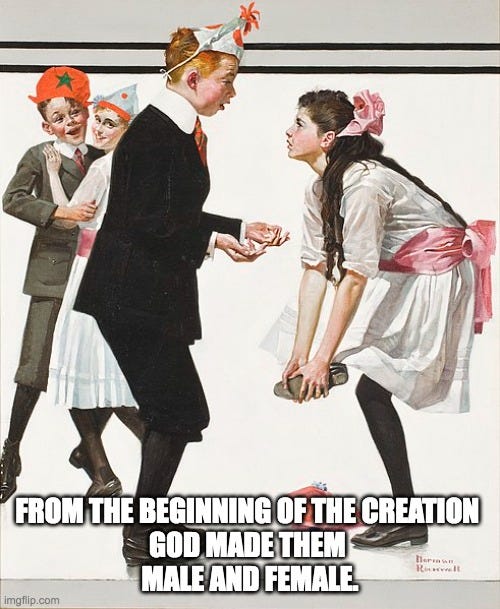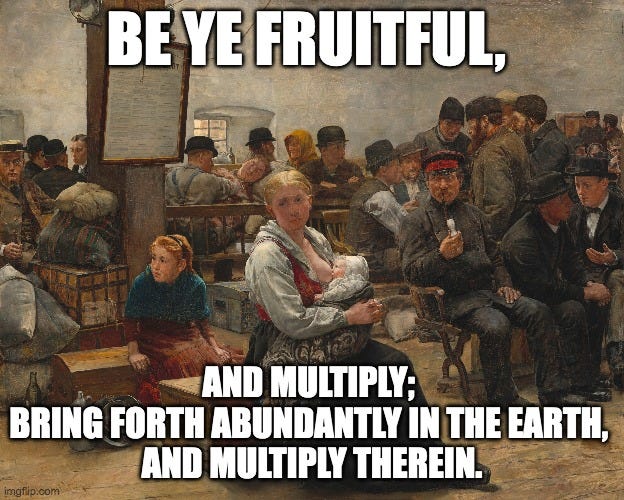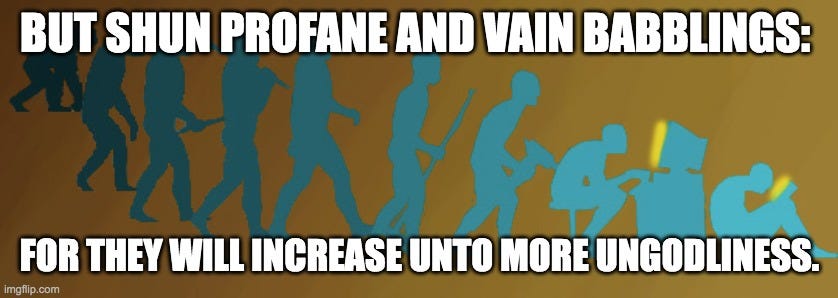And God said,
Let us make man in our image, after our likeness: and let them have dominion over the fish of the sea, and over the fowl of the air, and over the cattle, and over all the earth, and over every creeping thing that creepeth upon the earth. So God created man in his own image, in the image of God created he him; male and female created he them.
And God blessed them, and God said unto them, Be fruitful, and multiply, and replenish the earth, and subdue it: and have dominion over the fish of the sea, and over the fowl of the air, and over every living thing that moveth upon the earth.
Gen 1:26-28
Time Machine
Ok, now, for several of my posts, I am going to need a time machine. I guess that makes it good that I am a sci-fi writer. Now, this time machine is really cool. First of all, it is big enough I can take y’all with me in it. Secondly, it not only has glass walls (all time machines should have glass walls. Or transparent aluminium, or at least a view screen!), but it also can see and record everything in the universe as it zips up and down the timeline.
I need my trusty time machine because I have some questions for my interlocutors that require some detailed diving down on specific times in history. It is all very well to propose theories that wave the hands over vast tracts of time and say, ‘Well, something like something could have happened sometime in all of this’, quite another to be able to propose one of the somethings.
For today’s ride in the time machine, we will go back to the ‘first thing’. That is the first life. And I’m going to let you believers in evolution take the controls. You will decide what you mean by the ‘first life’. With a couple of caveats:
1) By saying it is the ‘first’ life, I mean the life from which all other life came. If it lives briefly and then dies, leaving no offspring from which we all emerged, that is not the ‘first’ I am talking about.
2) By saying the first ‘life’, I mean something capable of replicating to the extent that it led to B, which led to C, which led to D… which led to you and me here now having a debate about evolution.
3) I am not asking you to say what it did look like. You are not God, to know such a thing. But I am asking you to be specific in your proposal. That when I ask ‘Did it have a cell wall?’ you don’t say, ‘We don’t know’. You are imagining this thing for the purposes of our discussion; you need to know what your imagined thing is like.
So, let’s hop in our time machine and zoom back. We’re going to ignore the speedometer and odometer here… we’re going to just zoom backwards while you count how many living things there are on the Earth… backwards and backwards while you count down… until you say ‘zero’. Then we ease the controls back until you say ‘one’, then go back and forth until we find the exact spot where you, not me, go from ‘zero’ to ‘one’. And we stare at it. There it is. The first life, from which all other life sprung.
The First Life
And God said,
Let the earth bring forth grass, the herb yielding seed, and the fruit tree yielding fruit after his kind, whose seed is in itself, upon the earth: and it was so. And the earth brought forth grass, and herb yielding seed after his kind, and the tree yielding fruit, whose seed was in itself, after his kind: and God saw that it was good.
And the evening and the morning were the third day.
Gen 1:11-13
And now we start asking ourselves some questions.
1) What was there just before this zero-to-one transition? All of our experiments have very clearly shown that all of the bits that go together to make up life are very, very fragile. Some of them can only last seconds, if that, in a wild environment. They need the controlled environment of the cell to ‘survive’… i.e. stay intact enough to function.
2) What are the minimum number of features necessary for the first life? We’ve all seen funny images of the first car, the first aeroplane, etc. (NB: these were designed). But in order to be the *first* life, it isn’t enough to look funny and have some life-like features, you have to be able to survive long enough to produce offspring. So what are the minimum number of features that this first life would have to have?
Again, I would note that I am not asking my interlocutors to tell me what the first life *was* like. I’m asking them to imagine what it could have been like, to imagine one possibility. One actual possibility, not a bit of handwaving. Specifically, what precursors would have been there in the instant before (and how did they survive), and what are the minimum features necessary (hereafter MFN) for the first life?
Why do I want to know? Well, because evolution is impossible. Clearly impossible. But its advocates get around its impossibilities by never producing a theory with details specific enough to challenge. But any theory can work great as long as you ignore all of the specifics!
All at the Same Time
One problem with the first life is that it would need to be very complex. Unlike the first bicycle or first car, it would have to work. And by ‘work’, we mean the incredibly difficult task of extracting energy from the environment and using that energy to reproduce all without falling apart into component pieces. I am no biologist, but even I could play a pretty successful game when someone says, “Well, it would have to have elements A, B, and C’ of asking ‘what about D?’.
Let’s just list them in the vaguest possible way: 1) It would have to have a functioning reproductive system, and 2) It would have to have a successful energy gathering and usage system. But then we need to add 1b) The reproductive system would have to have a method for getting energy from the energy system. Oh, and 3) The entire organism would have to have a system in place to separate it from the environment so that the energy and reproductive systems don’t wander off from each other. And 3b) The separation system would have to be able to protect these systems from the outside environment long enough for them to do their work. Oh, and 1c) The reproductive system would have to be able to recreate the entire organism, not just one part. So somehow, the information for 1,2,3 and whatever else turns out to be necessary would have to be encoded in the reproductive system.
And all of these systems must work the very first time. Sure, there can have been a gazillion other ‘first’ lives that didn’t work… but they weren’t the first life that we are talking about. A first life which fits our needs here will need to be one where the various systems all worked well enough for it to successfully reproduce, and its offspring to reproduce, etc.
And unlike the concept of natural selection, if they didn’t reproduce, then they can’t have improved from simpler forms. Even on its best day, natural selection can only work on things that reproduce, where the idea gets passed on to generations which can slowly improve it. Until the first actually reproducing life, this can’t happen.
The guy trying to make the first bike can take his failed copy, look at it, decide what didn’t work and why, and try again. He can even steal some of the parts from his first try. But if there is no designer for the first life, there is no one that can do that. The first try just gets tossed in the trash heap, nothing learned, nothing recovered.
So in order to become the first life, the poor slob has to get everything right the first time. Whatever qualities one needs to successfully reproduce, it needs to get them all right on the same throw of the dice. And, of course, the dice need to keep rolling in his favour that he doesn’t get washed out of his pond at the wrong time and that his children’s children don’t all get wiped out in some local catastrophe but instead survive long enough to start doing the whole ‘random mutation’ thing and producing different species.
All at the Same Time II
And by ‘All at the same time’, I mean ‘All at the same time’. No matter how simple you make this first life, in order to be a successful first life, it is going to have to have a LOT of elements. Each of the systems we listed above would be formed of dozens, probably thousands, of component parts.
Have you ever done construction? Or mechanics? Cause I can tell you what happens. You get on the job and, nine times out of ten, you are halfway done when you say, “I need a left-handed cross-screwed widget spanner”… and you send some goof off to the truck, or the shop, or Walmart, or Lowes to go get one. Because to get the job done, you have to have all of the parts.
And you have to have them at the same time. All at the same time. Now, for a house, ‘at the same time’ can cover months while we build the thing. But not so life. The materials that makeup life are incredibly fragile. Some of them can only last milliseconds in a ‘wild’ environment.
So, to get your first life, you would have to miraculously (and I use the word advisedly) have all of the right ingredients at the exact right time, in the exact same place, and have them come together just perfectly all within milliseconds.
Yeah, no, ain’t happening. It can’t happen outside of a ‘miracle’.
Conclusion
In order for a materialistic universe to produce a successful first life, by which I mean a life that goes on to successfully reproduce and start a chain of life that ends up with NFL teams and Barbie movies, a fantastically complex and exact organism has to be produced in a vanishingly small time frame from an impossible-to-assemble set of ingredients.
In other words… it would take a miracle.
Afterward
Most modern histories of mankind begin with the word evolution, and with a{21} rather wordy exposition of evolution, for much the same reason that operated in this case. There is something slow and soothing and gradual about the word and even about the idea. As a matter of fact, it is not, touching these primary things, a very practical word or a very profitable idea. Nobody can imagine how nothing could turn into something. Nobody can get an inch nearer to it by explaining how something could turn into something else. It is really far more logical to start by saying ‘In the beginning God created heaven and earth’ even if you only mean ‘In the beginning some unthinkable power began some unthinkable process.’ For God is by its nature a name of mystery, and nobody ever supposed that man could imagine how a world was created any more than he could create one. But evolution really is mistaken for explanation. It has the fatal quality of leaving on many minds the impression that they do understand it and everything else; just as many of them live under a sort of illusion that they have read the Origin of Species.
But this notion of something smooth and slow, like the ascent of a slope, is a great part of the illusion. It is an illogicality as well as an illusion; for slowness has really nothing to do with the question. An event is not any more intrinsically intelligible or unintelligible because of the pace at which it moves. For a man who does not believe in a miracle, a slow miracle would be just as incredible as a swift one. The Greek witch may have turned sailors to swine with a stroke of the wand. But to see a naval gentleman of our acquaintance looking a little more like a pig every day, till he ended with four trotters and a curly tail, would not be any more soothing. It might be rather more creepy and uncanny. The medieval wizard may have flown through the air from the top of a tower; but to see an old gentleman walking through the air, in a leisurely and lounging manner, would still seem to call for some explanation.{22} Yet there runs through all the rationalistic treatment of history this curious and confused idea that difficulty is avoided, or even mystery eliminated, by dwelling on mere delay or on something dilatory in the processes of things. There will be something to be said upon particular examples elsewhere; the question here is the false atmosphere of facility and ease given by the mere suggestion of going slow; the sort of comfort that might be given to a nervous old woman travelling for the first time in a motor-car.
GK Chesterton
Now I know that some naive men will immediately say, “Oh, but given a very long time…”. No. Just no. As Chesterton so pithily points out, the math doesn’t work.
Ok, so that’s not quite what Chesterton said, but it’s what he meant. Something impossible does not become more possible if you try lots of times. Something unlikely indeed becomes more likely if you try often enough. But it has to be not that unlikely, and you have to be able to try often enough.
Let’s take something not at all hard, not even in the same universe as hard. Let’s take the possibility that the four players at a bridge table will each receive only one suit during a given deal. (This is called a perfect hand). For one player the odds are:
158753389899:1
If they play 100 hands in a given day, the odds that one player will get a perfect hand are:
1587533898.:1
If they do that every day all year, the odds are:
4349407:1
and if they play every day for eighty years, the odds of one player at the table having received a perfect hand ruing all those long years are:
54367:1
Once. That it will happen once, in eighty years, if they play 100 hands every day, every single day. It would take 54 thousand people, playing 100 bridge hands every day for eighty years, to have a good chance of one of them having a perfect hand… once.
Now, let us take the odds of all four of them getting a perfect hand. Odds that are way, way easier than the idea of all of the elements of life coming together at the same millisecond on a primitive Earth. The odds for all four players are:
6.35 x 10^44
One hundred hands a day… 6.35 x 10^42, 365 days 1.740200007414395e40, eighty years 2.175250009267993e38. One billion sets of players? 2.175250009267993e29.
That’s two, followed by twenty-nine zeros, for the odds of one billion sets of players playing 100 games a day for eighty years. To achieve something far, far easier than the first life.
Do you want more time? Let’s make it eighty billion years. 2.175250009267993e20 That’s two, followed by twenty zeros. It can’t happen… it didnt’ happen.
https://mathworld.wolfram.com/Bridge.html
Introduction
Wait, what’s the introduction doing way down here? Well, this post is kind of out of the thread of two different sets of letters. Or in both of them, as you wish. So a kind of mixed introduction, down here.
As far as my discussion with
is concerned, he could look at this post as another way to attack evolutionists. The problem of the ‘first thing’ is a mathematical disaster for the evolutionist. It is a flat-out impossibility. If every atom in the universe had been busy banging on a typewriter since the dawn of time, they couldn’t produce the works of Shakespeare; and it is even more impossible that the various components necessary to produce the first life could all be present at the same time and come together in an organised pattern. Can’t happen, ergo didn’t happen.As far as
, this could well be seen as a post in that thread. He keeps asking me if it isn’t hard to be a creationist in today’s age. To which I keep responding that it’s way, way easier than being an evolutionist.Links
Attacking Evolution via Methodological Naturalism
Attacking Evolution via Ground Rules
Creation Reformation promoting ‘evidence’.
Creation Reformation’s Substack








Yes yes. Catch up with you later. Im on night shift and woke up in the middle of my night and saw your response’s and had to reply. I need rest. Talk to you soon
I am not frustrating because you have shook me on any proof in your favour. Actually the opposite. But i too am busy and don’t want to violate our rules so i will just need more time to reply over the next bit. Talk to you soon